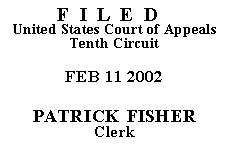

| UNITED STATES OF AMERICA, |
(W.D. Okla.) |
Before SEYMOUR, Circuit Judge, BRORBY,
Senior Circuit Judge, and EBEL,
Circuit Judge.
After examining the briefs and appellate record, this panel has determined
unanimously that oral argument would not materially assist the determination of
this appeal. See Fed. R. App. P. 34(a)(2); 10th Cir. R. 34.1(G). The case is
therefore ordered submitted without oral argument.
Ronnie Gerald Wiggins appeals from the district court's decision to sentence him pursuant to the Armed Career Criminal Act, 18 U.S.C. § 924(e)(1). We have jurisdiction pursuant to 18 U.S.C. 3742(a) and 28 U.S.C. § 1291. We affirm.
Mr. Wiggins was indicted and pled guilty to a violation of 18 U.S.C. § 922(g)(1), felon in possession of a firearm. Section 922(g)(1) carries a maximum term of imprisonment of ten years. 18 U.S.C. § 924(a)(2). Mr. Wiggins argues the district court violated his Fifth Amendment rights to presentment or indictment from a grand jury and due process of law when it sentenced him to 200 months in prison under the Armed Career Criminal Act, 18 U.S.C. § 924(e)(1).
Mr. Wiggins argues he should not have been sentenced under the Armed Career Criminal Act because his prior convictions were not charged as elements of the crime in his indictment. He contends a change in judicial alliances between the issuance of Almendarez-Torres v. United States, 523 U.S. 224 (1998), and Apprendi v. New Jersey, 530 U.S. 466 (2000), "forecasts a new majority in the Supreme Court, which will or may likely support recidivism as an element of the offense." However, he concedes this court held the sentence provision in the Armed Career Criminal Act, 18 U.S.C. § 924(e)(2), is not an element of the offense in United States v. Dorris, 236 F.3d 582, 587 (10th Cir.), cert. denied, 121 S. Ct. 1635 (2000). Mr. Wiggins brings this appeal in anticipation of action by the United States Supreme Court overruling Almendarez-Torres, in view of the five-to-four Apprendi opinion.
Apprendi acknowledged the narrow exception established in Almendarez-Torres (1998), applies when the fact used to enhance the sentence is a prior conviction. Apprendi, 530 U.S. at 489-90. In addition, United States v. Martinez-Villalva, 232 F.3d 1329, 1332 (10th Cir. 2000), held an indictment that did not contain a separate charge for prior conviction of an aggravated felony did not violate the defendant's constitutional rights.
We are bound by Almendarez-Torres, Dorris and Martinez-Villalva. See United States v. Wilson, 244 F.3d 1208, 1216 (10th Cir.), cert. denied, 121 S. Ct. 2619, 122 S. Ct. 186 (2001). "The new rule of Apprendi specifically carves out the recidivism issue, requiring that facts 'other than the fact of a prior conviction' be proven to a jury." Id. (citation omitted). "There is no way to predict whether the Supreme Court would overrule Almendarez-Torres on further consideration, and in fact there may be valid reasons for treating recidivism as an exception to Apprendi." Id. at 1216-17.
Accordingly, we AFFIRM Mr. Wiggins' sentence.
Entered by the Court:
WADE BRORBY
United States Circuit Judge
*. This order and judgment is not binding precedent except under the doctrines of law of the case, res judicata and collateral estoppel. The court generally disfavors the citation of orders and judgments; nevertheless, an order and judgment may be cited under the terms and conditions of 10th Cir. R. 36.3.